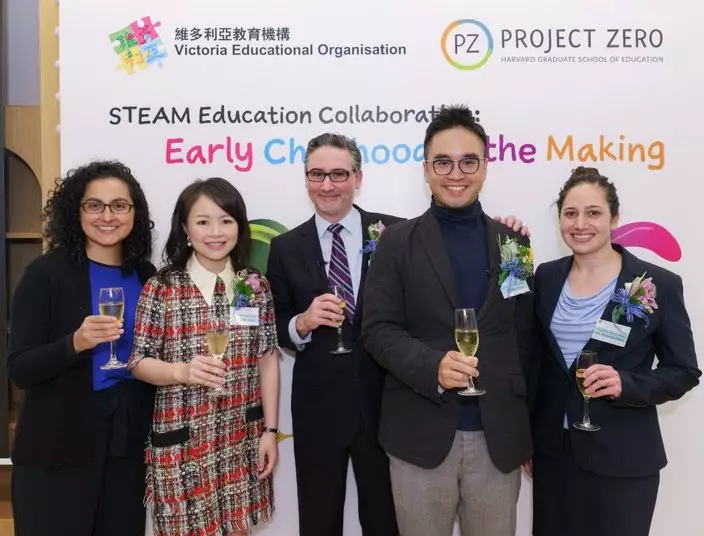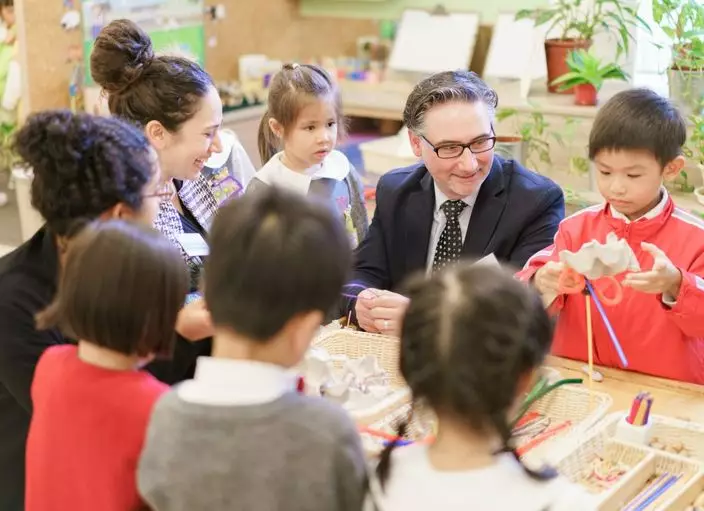Victoria Educational Organisation to nurture a new generation of "makers"
Victoria Educational Organisation (VEO) and Project Zero, Harvard Graduate School of Education (HGSE) proudly announce a new partnership that will take the form of a two-year pilot study called "Agency by Design: Early Childhood in the Making". VEO is the first kindergarten group in the world to work with Project Zero to explore and develop an early childhood specific programme and framework for Science, Technology, Engineering, Arts and Math (STEAM) education that supports maker-centered learning. This partnership also represents the strong commitment of Chow Tai Fook (CTF) Education Group, the owner of VEO, to provide the best learning opportunities to students leveraging insights from one of the world’s leading universities.

From left to right: Lynneth Solis, Researcher of Project Zero, HGSE; Jennifer Yu, Manager of VEO and Executive Director of CTF Education Group; Edward Clapp, Project Director of Project Zero, HGSE; Adrian Cheng, Vice Chairman of VEO and Executive Director of CTF Education Group; Andrea Sachdeva, Senior Project Manager of Project Zero, HGSE. (Supplied Photo)
Through this pilot study partnership with researchers from Project Zero, VEO aims to strengthen our STEAM teaching pedagogies and programme by integrating maker- centered learning principles developed by Project Zero team working with the Agency by Design initiative into everyday classroom teaching. Maker-centered learning is important as it empowers young learners as creators - to build and design - and in the process helps them develop skills such as observation, creativity, problem solving, and collaboration. Maker-centered learning aims to instill in learners an inquisitiveness in arts and design aspects of objects and systems, fostering a "can-do spirit" as well as empowering them to affect change in their surroundings.
"We strongly believe every child is a 'maker' with unlimited imagination," said Dr. Adrian Cheng, Vice Chairman of VEO and Executive Director of CTF Education Group. "The primary goal of our ground-breaking pilot research study with Project Zero is to empower our children from a very young age to be reflective explorers and instill in them a confidence to be creators. VEO is committed to providing the best education to our students so that they are equipped to meet the challenges of the 21st century."
This unprecedented initiative evolved because of the forward-thinking approach to teaching and learning at VEO. "Our right brain, which develops first, is responsible for imagination and creativity. Maker-centered learning is important as it empowers young learners as creators - to build and design - and in the process helps them build skills such as observation, creativity, problem solving, and collaboration," added Mrs. Jennifer Cheng, School Board Member of VEO and Executive Director of the CTF Education Group. "The collaborative inquiry with researchers from Project Zero will support us in enhancing VEO's STEAM program and ultimately equip our students to be 'Global Citizens for Tomorrow'."

The Researchers of Project Zero are watching how the students use their imagination and creativity to learn from the construction and design in one of the institutions of VEO. (Supplied Photo)
As a result of this exciting pilot study, VEO and Project Zero researchers will develop teaching strategies that promote creativity and innovation for young learners. Project Zero aspires to create a playbook of the practices and pedagogies of maker-centered learning that would stimulate teaching in early years all around the world. Selected educators at VEO are currently undergoing training on the work of Agency by Design in preparation for the pilot study which will begin later this academic year and will be rolled out to all eight VEO campuses in phases.
"For the past five years, the work of Agency by Design has helped us understand how to support young people in becoming maker-empowered agents of change," said Edward P. Clapp, Principal Investigator with Project Zero. "Working with the Victoria Educational Organisation, we are excited to see how the tools and frameworks we have developed may be adapted to suit our youngest learners. We are certain that the fruits of this pilot study with our new colleagues in Hong Kong will have a great effect on the broader field of design and maker-centered learning."
The partnership with Project Zero team underscores VEO's commitment to educational excellence for the holistic development of children. The integration of maker-centered learning into everyday classroom teaching will foster and reinforce characteristics associated with creative, abstract and critical thinking capacities in preparation for further learning in primary and secondary school. It is expected that the pilot results will inject new impetus into the development of early childhood education in the world.


